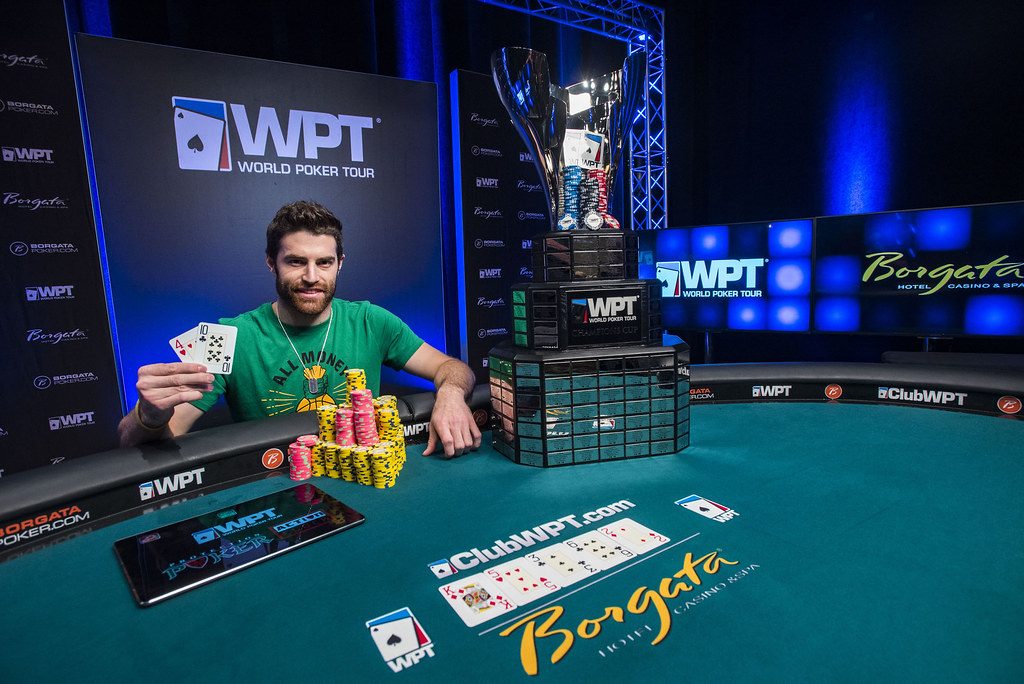World Poker Tour considers deal-making and seeks player input
Deal-making has been around for almost as long as the game of poker has existed. Skilled players in big tournament fields know that their earnings can be massively impacted by variance. Striking a deal to flatten the payouts once they reach the final few players helps stabilise earnings and limit the potency of chance.
Everyone accepts deal-making is a reasonable practice and almost no one thinks it is wrong or unethical. But still, major tours like WPT and WSOP have traditionally shied away from letting players publicly make deals in their events.
In the case of the WPT, that could now be about to change.
Policies against deals questioned again after WPT Borgata

After WPT Borgata came to a close, the official WPT live updates of the event posted a quote from winner Donald Maloney in which he said
“The guys had decided that they were exhausted and didn’t really want to play anymore, so we decided to do a flip”.
WPT then reported the players as having collected the officially listed prizes for 1st to 3rd place.
Confusingly, reports from other outlets stated that a deal had been struck and the three players agreed to just shove the next hand to determine a winner. Donald Maloney won the hand, and the title with 
 . His true winnings after the deal were then reported widely as being $487,784, not the original prize of $616,186. This led to an exasperated tweet by Allen Kessler which reopened the debate about deal-making.
. His true winnings after the deal were then reported widely as being $487,784, not the original prize of $616,186. This led to an exasperated tweet by Allen Kessler which reopened the debate about deal-making.
Cmon guys @wpt theres zero chance it actually played out this way. Just admit you broke your no deal policy. No one cares anyway. You should allow deals. pic.twitter.com/HG0mYt068x
— Allen Kessler (@AllenKessler) September 21, 2019
The WPT and WSOP have always had policies which do not allow for deal-making and it is, in many ways, understandable. If all the money is chopped between three or four players then the remaining players flip for the title, it almost taints the victory and devalues the title.
Furthermore, television companies want to be able to bring their viewers the tension of those final stages where players are making decisions for huge amounts of money. That’s where the entertainment in tournament poker resides, at least in the eyes of the casual viewer.
The other important point is that, having a policy against deal-making forces players to strike their own deals based on trust which aren’t officially sanctioned. Pushing deals into the shadows in this way can cause players to be taken advantage of when an opponent wins a tournament and then refuses to honour a deal made at an earlier stage.
Unofficial deals can also lead to the farce which arose at the $100K High Roller at the 2018 WSOP. Nick Petrangelo and Elio Fox went to the rail to talk when stacks were level during heads up play. After returning, they started placing a blind button open and a blind 3-bet, before very quickly playing the rest of the hand out. It did not make for good viewing.
Matt Savage calls on the poker world to offer thoughts and ideas
The @WPT wants your opinion on dealmaking for the main tour. There are multiple factors to consider including a Tournament of Champions seat, POY points, television production, as well as live reporting. What are your thoughts on how this should take place when deals are allowed? pic.twitter.com/uaI5tsK8ni
— Matt Savage (@SavagePoker) September 24, 2019
To WPT’s credit, Tournament Director Matt Savage embraced the debate on Twitter a week later, asking poker players to voice their opinions on the subject. Public opinion seemed to mostly find consensus on the fact that deals should be facilitated, with most also feeling that something meaningful should be left to play for. This is a similar system found on major online poker rooms and it seems to work well.
For televised live tournaments, viewers want to see a true champion lift the trophy, and players clearly want the freedom to make deals. Facilitating deals openly in front of the cameras, while leaving something such as 10% of the prize pool left to play for would seem to appease both sides of the debate.
The WPT’s interest in communicating with players suggests such a solution could be brought in for future seasons of the tour. With the WSOP however, progress on the subject seems unlikely to be made anytime soon.
The solution: Deal-making becomes part of the show?
Without doubt, one of the biggest issues with deal-making is the crowing of illegitimate champions. From a viewer’s perspective, they tune in to watch a hard-fought contest for a great prize because that’s what sport is all about. They then feel somewhat cheated when players don’t bother playing it out and just flip a coin for the trophy. They may also feel confused by the fact that two apparently great poker players are playing like they’re a couple of drunks at a play money table.
TV production should want this. Dealmaking for TV events could really spice things up. Commentators can discuss what’s happening, the deal results, explain the good and the bad, analyze it, etc.
— Donnie Peters (@Donnie_Peters) September 24, 2019
It seems that the only way to keep viewers and players happy is to bring deal-making out into the light and let viewers watch the negotiations. There’s entertainment in that and players get to flatten the payout structure and reduce variance. Keeping 10% of the prize money and the trophy to one side for the winner ensures that all remaining players give their best to win a genuine contest. In this instance, the viewers and players are both treated fairly, and prestigious competitions are treated with respect.
Article by Craig Bradshaw

















